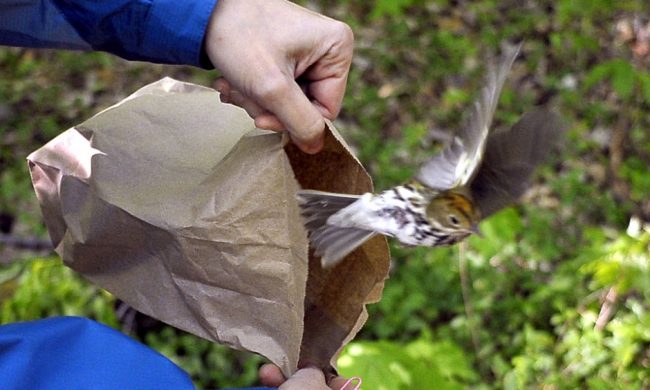Ontario Nature Blog
Receive email alerts about breaking conservation
and environmental news.
© Lora Denis
Many birds migrate at night, guided by the stars and constellations. In Toronto, as in other North American cities, migrating birds are attracted to the lights left on overnight in downtown buildings. This often results in deadly collisions.
During the day, buildings can pose a similar threat. Birds see their habitats reflected in windows and get confused by ornamental plants in lobbies and solariums. This confusion can also cause fatal collisions.
An estimated 100 million to 1 billion migrating birds are killed annually in collisions with buildings in North America. This begs the question of why we don’t see more dead birds on our morning commutes into work.
Long before Bay Street is swarming with suits and briefcases, there is another group patrolling the streets of Toronto. If you’re up before dawn, you may be lucky enough to spot Fatal Light Awareness Program (FLAP) Canada volunteers searching downtown streets for injured birds.
FLAP is the first non-profit organization to address the issue of bird collisions with buildings. Consisting of approximately 100 dedicated volunteers, FLAP works tirelessly to rescue injured birds and document nightly fatalities.

I had the opportunity to join FLAP volunteer, Jill Edwards, on one of her morning rounds. When I say ‘rounds’ I should really say ‘journeys’ because it felt like we covered every nook and cranny of downtown in the three hours I spent with her.
Allowing me to tag along with her on a typical morning route, Jill met me on the corner of Bay and King at 5:30 a.m. A long-standing volunteer with FLAP, Jill shared her stories with me – some had happy endings, though many did not. Thankfully, it was “a quiet morning” on this particular Wednesday. I learned how to spot an injured bird, where the most frequent collisions occur and why, and about the incredible work FLAP does to protect migratory birds.
FLAP’s dedicated volunteers make this work possible. Volunteers who, like Jill, start their day long before our alarms go off.
To learn more about FLAP and how to report your sightings, visit flap.org.

Gananoque Lake Nature Reserve © Smera Sukumar